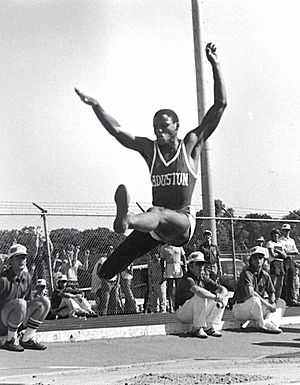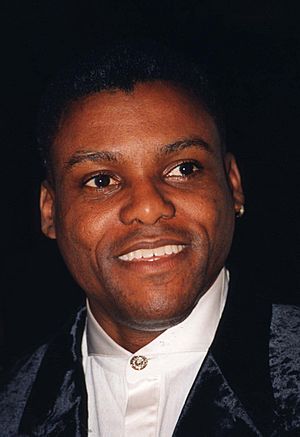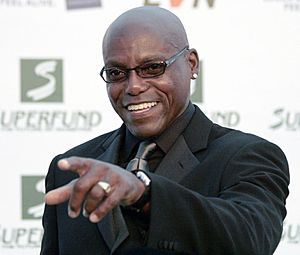Carl Lewis facts for kids
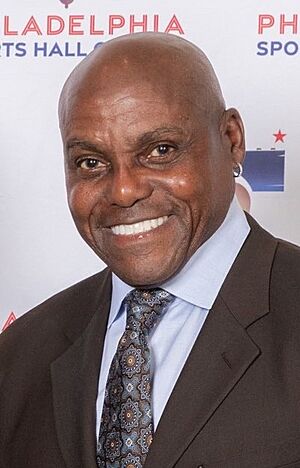
Lewis in 2023
|
||||||||||||||||||||||||||||||||||||||||||||||||||||||||||||||||||||||||||||||||||||||||||||||||||||||||||||||||||||||||||||||||||||||||||||||||||||||||||||||||||
| Personal information | ||||||||||||||||||||||||||||||||||||||||||||||||||||||||||||||||||||||||||||||||||||||||||||||||||||||||||||||||||||||||||||||||||||||||||||||||||||||||||||||||||
|---|---|---|---|---|---|---|---|---|---|---|---|---|---|---|---|---|---|---|---|---|---|---|---|---|---|---|---|---|---|---|---|---|---|---|---|---|---|---|---|---|---|---|---|---|---|---|---|---|---|---|---|---|---|---|---|---|---|---|---|---|---|---|---|---|---|---|---|---|---|---|---|---|---|---|---|---|---|---|---|---|---|---|---|---|---|---|---|---|---|---|---|---|---|---|---|---|---|---|---|---|---|---|---|---|---|---|---|---|---|---|---|---|---|---|---|---|---|---|---|---|---|---|---|---|---|---|---|---|---|---|---|---|---|---|---|---|---|---|---|---|---|---|---|---|---|---|---|---|---|---|---|---|---|---|---|---|---|---|---|---|---|---|
| Nickname(s) | Carl Lewis | |||||||||||||||||||||||||||||||||||||||||||||||||||||||||||||||||||||||||||||||||||||||||||||||||||||||||||||||||||||||||||||||||||||||||||||||||||||||||||||||||
| Born | July 1, 1961 Birmingham, Alabama, U.S. |
|||||||||||||||||||||||||||||||||||||||||||||||||||||||||||||||||||||||||||||||||||||||||||||||||||||||||||||||||||||||||||||||||||||||||||||||||||||||||||||||||
| Height | 6 ft 2 in | |||||||||||||||||||||||||||||||||||||||||||||||||||||||||||||||||||||||||||||||||||||||||||||||||||||||||||||||||||||||||||||||||||||||||||||||||||||||||||||||||
| Weight | 176 lb | |||||||||||||||||||||||||||||||||||||||||||||||||||||||||||||||||||||||||||||||||||||||||||||||||||||||||||||||||||||||||||||||||||||||||||||||||||||||||||||||||
| Sport | ||||||||||||||||||||||||||||||||||||||||||||||||||||||||||||||||||||||||||||||||||||||||||||||||||||||||||||||||||||||||||||||||||||||||||||||||||||||||||||||||||
| Country | ||||||||||||||||||||||||||||||||||||||||||||||||||||||||||||||||||||||||||||||||||||||||||||||||||||||||||||||||||||||||||||||||||||||||||||||||||||||||||||||||||
| Sport | Track and field | |||||||||||||||||||||||||||||||||||||||||||||||||||||||||||||||||||||||||||||||||||||||||||||||||||||||||||||||||||||||||||||||||||||||||||||||||||||||||||||||||
| Event(s) | 100 meters, 200 meters, long jump, 4 × 100 m relay | |||||||||||||||||||||||||||||||||||||||||||||||||||||||||||||||||||||||||||||||||||||||||||||||||||||||||||||||||||||||||||||||||||||||||||||||||||||||||||||||||
| College team | Houston Cougars | |||||||||||||||||||||||||||||||||||||||||||||||||||||||||||||||||||||||||||||||||||||||||||||||||||||||||||||||||||||||||||||||||||||||||||||||||||||||||||||||||
| Club | Santa Monica Track Club | |||||||||||||||||||||||||||||||||||||||||||||||||||||||||||||||||||||||||||||||||||||||||||||||||||||||||||||||||||||||||||||||||||||||||||||||||||||||||||||||||
| Retired | 1997 | |||||||||||||||||||||||||||||||||||||||||||||||||||||||||||||||||||||||||||||||||||||||||||||||||||||||||||||||||||||||||||||||||||||||||||||||||||||||||||||||||
| Achievements and titles | ||||||||||||||||||||||||||||||||||||||||||||||||||||||||||||||||||||||||||||||||||||||||||||||||||||||||||||||||||||||||||||||||||||||||||||||||||||||||||||||||||
| Personal best(s) |
|
|||||||||||||||||||||||||||||||||||||||||||||||||||||||||||||||||||||||||||||||||||||||||||||||||||||||||||||||||||||||||||||||||||||||||||||||||||||||||||||||||
|
Medal record
|
||||||||||||||||||||||||||||||||||||||||||||||||||||||||||||||||||||||||||||||||||||||||||||||||||||||||||||||||||||||||||||||||||||||||||||||||||||||||||||||||||
Frederick Carlton "Carl" Lewis (born July 1, 1961) is a retired American track and field athlete. He is one of the most successful athletes in history. Lewis won nine Olympic gold medals, one silver medal, and ten World Championships medals.
His amazing career lasted from 1979 to 1996. He was a top sprinter and long jumper. Lewis is one of only six athletes to win a gold medal in the same event at four straight Olympic Games. He is also the head track and field coach for the University of Houston.
From the early 1980s to the early 1990s, Lewis was often ranked number one in the world in the 100 m, 200 m, and long jump. He set world records in the 100 m and the 4 × 100 m relay. For ten years, he won 65 long jump competitions in a row, one of the longest winning streaks in sports history.
Because of his incredible achievements, Lewis has received many awards. He was named "World Athlete of the Century" and "Sportsman of the Century." After retiring from sports, Lewis became an actor and appeared in several movies.
Contents
An Athlete's Journey
Growing Up in a Sports Family
Carl Lewis was born in Birmingham, Alabama, on July 1, 1961. His parents, William and Evelyn Lewis, were both involved in track and field. His mother was a hurdler, and his parents ran a local athletics club. This helped both Carl and his sister, Carol Lewis, become great athletes.
His father was his first coach. At age 13, Lewis started competing in the long jump. In high school, he became one of the best junior long jumpers in the world. Many colleges wanted him, but he chose the University of Houston to work with coach Tom Tellez. Tellez coached Lewis for his entire career.
In 1979, just after high school, Lewis broke the high school long jump record. He was quickly ranked as one of the best long jumpers in the world. He qualified for the 1980 Olympics in Moscow, but the United States boycotted the games, so he could not compete.
Becoming a World Champion
In 1981, Lewis greatly improved his personal best in the long jump. He also became the fastest 100 m sprinter in the world. For the first time, he was ranked number one in both the 100 m and the long jump.
In 1982, Lewis continued to dominate. People wondered if he could beat Bob Beamon's long jump world record of 8.90 m (29 ft 2.26870079 in), which was set at the 1968 Summer Olympics. That year, Lewis jumped farther than 28 feet five times. He was also named Athlete of the Year by Track and Field News.
The first-ever World Championships were held in Helsinki in 1983. Lewis won the long jump easily. He also won the 100 m race. To top it off, he was the final runner (the anchor) for the 4 × 100 m relay team, which won and set a new world record.
1984 Summer Olympics: A Historic Performance
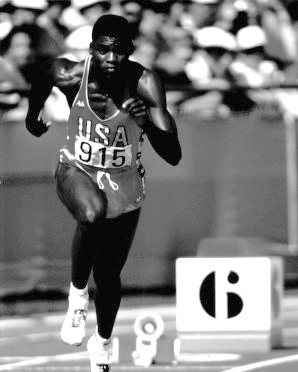
At the 1984 Summer Olympics in Los Angeles, Lewis aimed to do something amazing. He wanted to match the achievement of Jesse Owens by winning four gold medals at a single Olympics.
First, he won the 100 m race. Next was the long jump, which he also won easily. His first jump was so good that he knew it would be enough to win. To save energy for his other events, he passed on his last four jumps.
His third gold medal came in the 200 m, where he set a new Olympic record. Finally, he won his fourth gold medal in the 4 × 100 m relay. His team set a new world record, and Lewis had successfully matched Jesse Owens's historic feat.
Famous Rivalries and Competitions
Showdown with Ben Johnson
After the 1984 Olympics, Lewis remained a top athlete. But a new challenger appeared in the 100 m sprint: Canadian runner Ben Johnson. In 1986, Johnson beat Lewis at the Goodwill Games.
At the 1987 World Championships in Rome, the 100 m final was a huge event. Johnson won with a stunning new world record of 9.83 seconds. Lewis finished second with a time of 9.93 seconds. Lewis also won gold in the long jump and the 4 × 100 m relay at the same championships.
The 1988 Summer Olympics
The 100 m final at the 1988 Summer Olympics in Seoul, South Korea, was one of the most talked-about races in sports history. Johnson won again, setting another world record. Lewis finished second, setting a new American record.
However, three days later, Johnson tested positive for banned substances. His medal was taken away, and Lewis was awarded the gold medal. Lewis's time of 9.92 seconds became the new Olympic record.
In the long jump, Lewis won another gold medal. He also earned a silver medal in the 200 m race.
1991 World Championships: An Unforgettable Meet
The 1991 World Championships in Tokyo were the site of some of Lewis's greatest performances. In the 100 m final, he faced his top rivals. In the fastest 100 m race ever at that time, Lewis won and set a new world record of 9.86 seconds.
The Greatest Long Jump Battle
The long jump final at the 1991 World Championships is considered one of the best sports competitions ever. Lewis had not lost a long jump competition in 10 years. His main rival was Mike Powell.
Lewis started with a huge jump of 8.68 m (28 ft 5.60728347 in). Later, he jumped 8.91 m (29 ft 2.66240158 in), which was farther than the world record, but it didn't count as a new record because of a strong tailwind.
Then, Powell made history. He jumped 8.95 m (29 ft 4.23720473 in), breaking Bob Beamon's 23-year-old world record. Lewis had two more chances but couldn't beat Powell's mark. His best legal jump was 8.87 m (29 ft 1.08759843 in), a new personal best. For the first time in a decade, Lewis lost a long jump competition, but he was part of an epic showdown.
Final Years and Legacy
Lewis continued to compete and succeed. At the 1992 Barcelona Olympics, he won another gold medal in the long jump. He also anchored the 4 × 100 m relay team to another world record.
In 1996, Lewis qualified for his fifth Olympic team in the long jump. At the 1996 Summer Olympics in Atlanta, he won the event with a jump of 8.50 m (27 ft 10.52066930 in). This made him one of only three Olympians to win the same individual event four times in a row. His nine Olympic gold medals tie him for second place among all Olympians.
Lewis retired from track and field in 1997, leaving behind a legacy as one of the greatest athletes of all time.
Life After Athletics
After retiring, Lewis appeared in several films and television shows. In 2011, he tried to run for the New Jersey State Senate. However, he was not allowed to run because he did not meet the four-year residency requirement for living in the state.
As of 2025, Lewis is the head coach for the track and field team at his old school, the University of Houston.
In 1990, Lewis became a vegan. He has said that his plant-based diet helped him achieve his great results in 1991. He believes it allowed him to train hard while staying healthy.
Honors and Awards
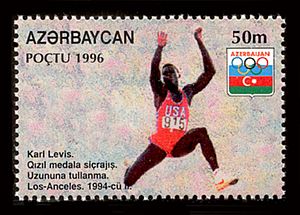
Carl Lewis has received many honors for his incredible career.
- 1999: Voted "Sportsman of the Century" by the International Olympic Committee.
- 1999: Elected "World Athlete of the Century" by the International Association of Athletics Federations.
- 1999: Named "Olympian of the Century" by Sports Illustrated.
- 2010: Inducted into the New Jersey Hall of Fame.
- 2016: Inducted into the Texas Track and Field Coaches Association Hall of Fame.
Personal Best Marks
- 100 m: 9.86 seconds
- 200 m: 19.75 seconds
- Long jump: 8.87 m (29 ft 1.08759843 in) (legal wind)
- 4 × 100 m relay: 37.40 seconds (world record at the time)
- 4 × 200 m relay: 1:18.68 minutes (world record at the time)
See also
 In Spanish: Carl Lewis para niños
In Spanish: Carl Lewis para niños
- Carl Lewis Athletics 2000, a video game
- List of vegans
- List of multiple Olympic gold medalists
- List of multiple Olympic gold medalists at a single Games
- List of multiple Olympic gold medalists in one event
- 100 metres at the World Championships in Athletics
- List of multiple Summer Olympic medalists
 | Stephanie Wilson |
 | Charles Bolden |
 | Ronald McNair |
 | Frederick D. Gregory |


